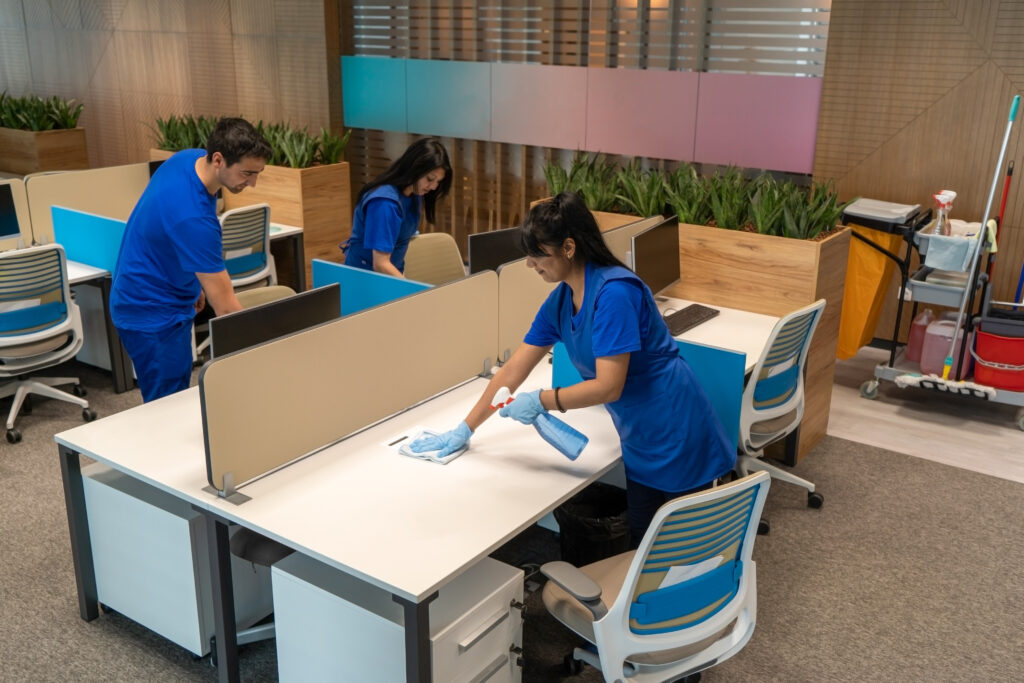Have you ever taken a moment to think about how the cleanliness of your workplace affects your employees’ health and productivity? If not, it’s high time you did. Maintaining a clean, organized, and healthy workplace doesn’t just contribute to the physical well-being of your employees—it’s also a surefire way to boost morale, enhance productivity, and, consequently, generate more profit. In short, healthier employees mean a wealthier business. Let’s explore why.
Cleanliness Enhances Productivity
A study conducted by the Harvard Business Review revealed that employees’ productivity can improve by as much as 5% in a clean and organized work environment. This apparent relationship underscores the importance of investing in cleanliness in business.
Cleanliness streamlines workflow, reducing time wasted searching for misplaced items amidst clutter. Moreover, the minimized distractions allow employees to focus better on their tasks, thus optimizing productivity. It also enhances mood and motivation, contributing to the workforce’s overall performance.
With these in mind, investing in cleanliness by getting janitorial service Fort Worth or in your area transcends the immediate goal of maintaining a healthy environment. It’s a strategic initiative that directly impacts your workforce’s efficiency and, ultimately, your company’s financial performance. This connection makes workplace cleanliness a high-return investment worth every penny.
Cleanliness Improves Safety

Safety in the workplace is a paramount concern, and cleanliness plays a vital role in mitigating hazards. Clutter and disorganization can lead to dangerous conditions, resulting in personal injury and potential work stoppages.
The U.S. Occupational Safety and Health Administration (OSHA) reports that slips, trips, and falls cause about 25% of all reported injury claims per fiscal year. A clutter-free, clean workspace can dramatically reduce these types of accidents, making safety a significant return on investment for maintaining cleanliness in the workplace.
Furthermore, regularly maintaining cleanliness reduces the proliferation of harmful pathogens, effectively decreasing the probability of illness among your workforce. This directly leads to a reduction in the number of sick days taken by your employees, ensuring consistent productivity and, consequently, steady revenue flow.
Overall, cleanliness doesn’t just contribute to a more pleasing and productive work environment—it’s a crucial component of a company’s safety strategy.
Cleanliness Boosts Employee Morale
Picture stepping into your office every morning and you’re greeted by stacks of disheveled documents, scattered stationery, and dust-laden surfaces. Your workspace is cramped and chaotic, impeding your ability to focus. Such a scene would unlikely spur enthusiasm or drive. It’s doubtful. Your work environment’s cleanliness—or lack thereof—significantly impacts your mental well-being and mood.
When your workspace is clean, organized, and clutter-free, it’s far easier to concentrate, manage tasks efficiently, and take pride in your work. Additionally, as an employer, this orderly environment indirectly signals a message of care and concern to your team members—it says, ‘Your health, happiness, and productivity matter to us.’ This subtle message can profoundly impact employee morale, engagement, and overall job satisfaction.
Cleanliness Offers Long-Term Savings Through Regular Building Maintenance
Yes, you may question, ‘Isn’t the upkeep of a clean workplace an expensive endeavor?’ While it’s true that there are initial costs involved, consider this expenditure as a worthwhile investment—one that delivers substantial returns. For one, by maintaining a clean and well-kept workplace, you can avoid the need for constant repairs and replacements—elements that inevitably result in considerable unexpected expenditures.
Consistent building maintenance ensures the workplace infrastructure and assets are in optimal condition. It mitigates the risk of premature wear and tear, thereby preventing the expenses associated with fixing or replacing broken equipment and furniture. Consequently, the resources initially allocated toward cleanliness and maintenance can translate into significant cost savings in the future.
By adopting a proactive stance towards cleanliness, your organization can effectively manage its long-term maintenance costs, reinforcing that cleanliness in the workplace isn’t an expense but an investment.
Cleanliness Serves As A Branding Tool
Now, pause for a moment and ponder over this scenario: a potential client or business partner walks into your workplace only to be greeted by disarray and untidiness. The chances are high that this unappealing sight might cast a negative shadow over your business’s image. Cleanliness isn’t merely about fostering a healthy and productive atmosphere—it’s an embodiment of your brand identity.
A meticulously maintained, organized workplace communicates your commitment to professionalism, keen attention to detail, and respect for the people who make your business thrive—your employees and visitors. This positive perception can play a significant role in securing new clients, retaining existing ones, and cultivating a trustworthy, professional image in your industry.
Key Takeaways
The benefits of a clean, organized, and sanitary workplace are too significant to overlook. Cleanliness boosts employee morale and productivity, reduces the occurrence of sick days, and saves you from expensive repairs. Moreover, a clean workplace strengthens your brand image and appeals to clients. Hence, investing in workplace cleanliness isn’t an unnecessary expense—it’s a smart business strategy that results in healthier employees and a wealthier business.




